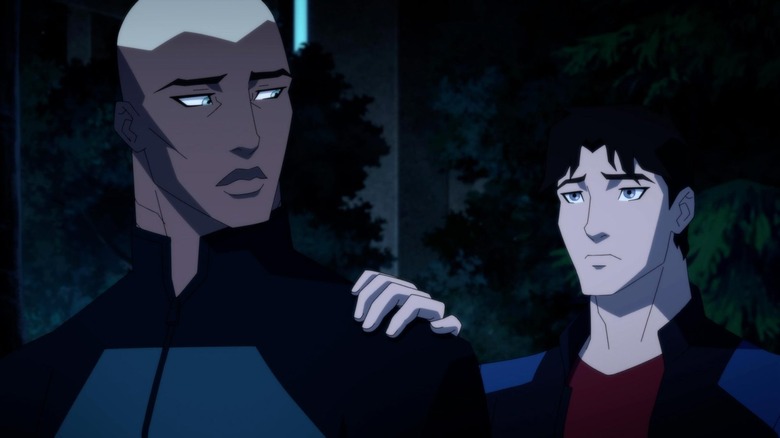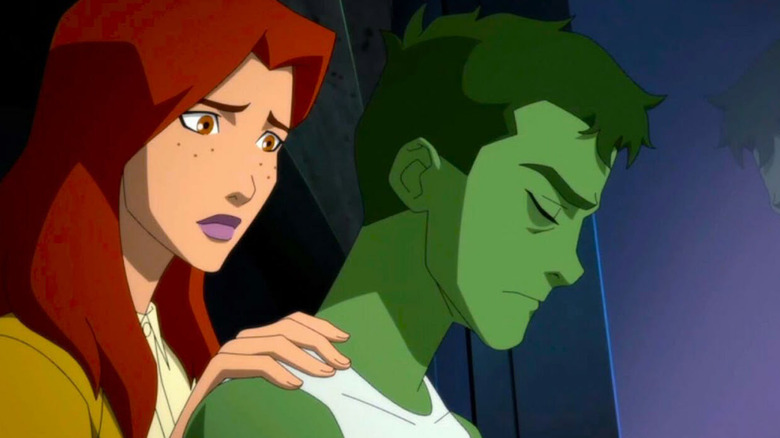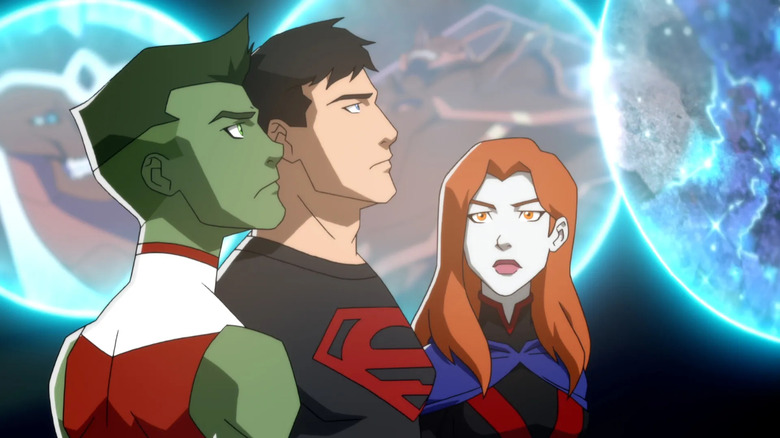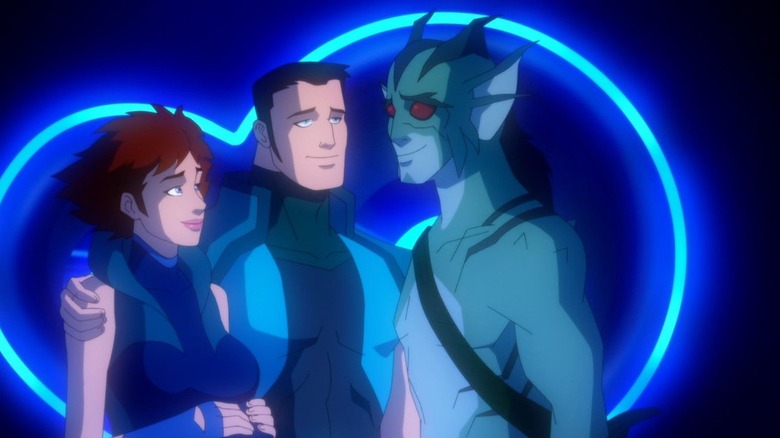Young Justice Showrunners On A More Focused Season 4, Queer Representation & The Chances Of A Crisis Event [Interview]
"Young Justice" is one of the best superhero shows around, and definitely the best animated one. The DC universe show, which follows beloved teen heroes such as Robin to Aqualand as they prove that they're more than just sidekicks, has evolved a lot during its four seasons and it is not showing any signs of slowing down.
Season 4, dubbed "Phantoms," has tightened the plot by focusing on shorter, self-contained story arcs that better manage the show's extensive ensemble. Likewise, it recontextualizes the history of the DC universe and changes key parts of the lore in new and exciting ways. The second half of the season begins with a new story arc focused on Aquaman and the appearance of a mythic Atlantean figure.
/Film spoke with showrunners and co-creators Brandon Vietti and Greg Weisman about wanting to keep things fresh in the fourth season by focusing on a smaller number of characters, queer representation in superhero shows, whether we can expect a Crisis event on the show, and more.
'We want to keep things fresh.'
Why was now the time to split the season into separate story arcs?
Vietti: One of the main reasons was that we want to keep things fresh. We also wanted the ability to dive deeper into individual stories of our core characters that we kind of have grown up with from season 1. We also had a number of production considerations as well, just in the name of producing a show and being conscious of budget. It was also very helpful for us to sort of stay in one location, following one character's story, without branching out into multiple locations, over many cities and many planets. That can be very expensive, very quick in terms of designing. And so, in addition to the focus on the character, it also focused our art, focused our budget so that we could tell the best stories possible in small arcs.
Weisman: It's 10 years later from the first season, and we wanted to bring it back to those first season characters and see where they are 10 years on. When it came to choosing the order of the arcs and the characters to focus on, that had more to do with the arc of the overall season story, but also trying to keep each arc really distinct from each other. So we went from exploring this planet, Mars, to something that was more down-to-earth with Tigress in the second arc. So we tried to keep changing things up throughout, but in terms of why we chose these specific characters, it had a lot to do with getting back to them from season one and sort of saying, "Okay, it's been 10 years. When you first met Dick Grayson, he was 13. Now he's 23, 24. And let's see how he's changed."
This season has also been dealing with serious subjects like grief, and the different ways it can manifest, why was that important to explore now?
Vietti: Well, I think that's something that from day one Greg and I really wanted to weave into the narrative. We set out to make a show about superheroes and teenagers in the most realistic way possible within an animated series and within such a fantastic universe like the DC Universe. And so, we wanted to find textures within our stories that really spoke to our audience in the most realistic way possible, and one of those textures is grief. There's many, many different ways to sell reality, but something I think all of us can relate to are the trials that life puts us through, how we deal with those psychologically with our friends, with our family, the ups and downs, the highs and lows.
All of that of course makes excellent story material, but then of course we wanted to play all of that out over a longer frame of time throughout our seasons. We never wanted to have stories that presented problems that were over within 30 minutes and forgotten by the next episode. That's not how life works. So we put a lot of time into thinking about, well, how does life work, and how can we incorporate that into the stories of these characters in a meaningful way?
And so that is really, I think, a driving goal for us. And of course we had many partners that we consulted with in terms of making sure that we were presenting a lot of these issues properly, best practices, and in some cases, worst practices for dealing with matters such as grief and other things so that we could sort of show both sides, what works, what doesn't, so that people, again, will be able to relate to what's happening within these fantastic stories.
'I'm sure we could find a way to get our own version of a Crisis.'
Something really cool about this season is how you connect Vandal Savage to the history of several DC heroes, like Doctor Fate and Arion. Tell me how you guys approach adapting the lore of the comics like this.
Weisman: We look for opportunities. Brandon and I look for opportunities to make the Earth-16 version of the DC Universe as cohesive and coherent as possible. We have the advantage of hindsight. You've got DC with 80-plus years of continuity behind it. That's hundreds and hundreds of writers, artists, and editors over those decades. And so, I think it's inevitable that there's duplication, there's inconsistency here and there. I'm not claiming that the same couldn't happen to us. I'm just saying that we have the advantage of being able to look back across DC's history over this period with hindsight.
With that, comes opportunity. We didn't name Dr. Fate Nabu. That's from DC lore, but Nabu is, in mythology, the son of Marduk. And we made Vandal Marduk, and then what that means is that Vandal is the father of Nabu, Dr. Fate, just as an example. And when you have a guy who's tens of thousands of years old that predates most of Earth history he's going to have been involved all the way along.
I think Brandon and I feel that if we like something, the odds are good the fans will. So if you have a moment that you're like, "Oh my God, that's so of cool. Vandal Savage is the father of Dr. Fate." It's like, we think that's pretty cool, so we think the fans will think it's pretty cool too. And that sort of becomes our guiding light.
The comics have a very known way of streamlining their story, through a Crisis event, do you see the show getting to a point where that is an option?
Weisman: The short answer is always no spoilers, but the thing about Crisis is that's generally involving multiple universes in the multiverse, and we are very focused on the Earth-16 or Universe-16. But, you never know.
Vietti: We have our hands full with the current story, but never say never. I think as Greg was saying, we love to look back into the history of the DC Universe and all of comics publishing and all of the great stories that have been told, and for us, everything is on the table. And if we have enough time and we're given the opportunity, I'm sure we could find a way to get to our version of a Crisis story someday down the road. But as Greg said, no spoilers for the time.
'We want our show to be a window on the world.'
This season has done a lot for queer representation in the show, from La'gaan and Aquaman to Halo coming out as non-binary. How was it to bring this to the screen?
Vietti: Diversity's always been very important to us, and representation has been very important to us. And as I was speaking of earlier, I think it's one of the many textures of reality that we wanted to put into the show to sell a realistic and relatable world to our audience. So I think first and foremost, that was something very important to us. We want our show to kind of be a window on the world and also, in a way, reflective of the world that will be watching this. We don't want to limit ourselves. That's not how the world looks. That's not how the world is. And so, we wanted very much to have this range of diversity and representation within our characters. Because again, I don't know how else to put it. That is the world around us.
Weisman: Times are changing, and it is a wonderful and vibrant thing to see.
"Young Justice: Phantoms" is currently airing on HBO Max.



